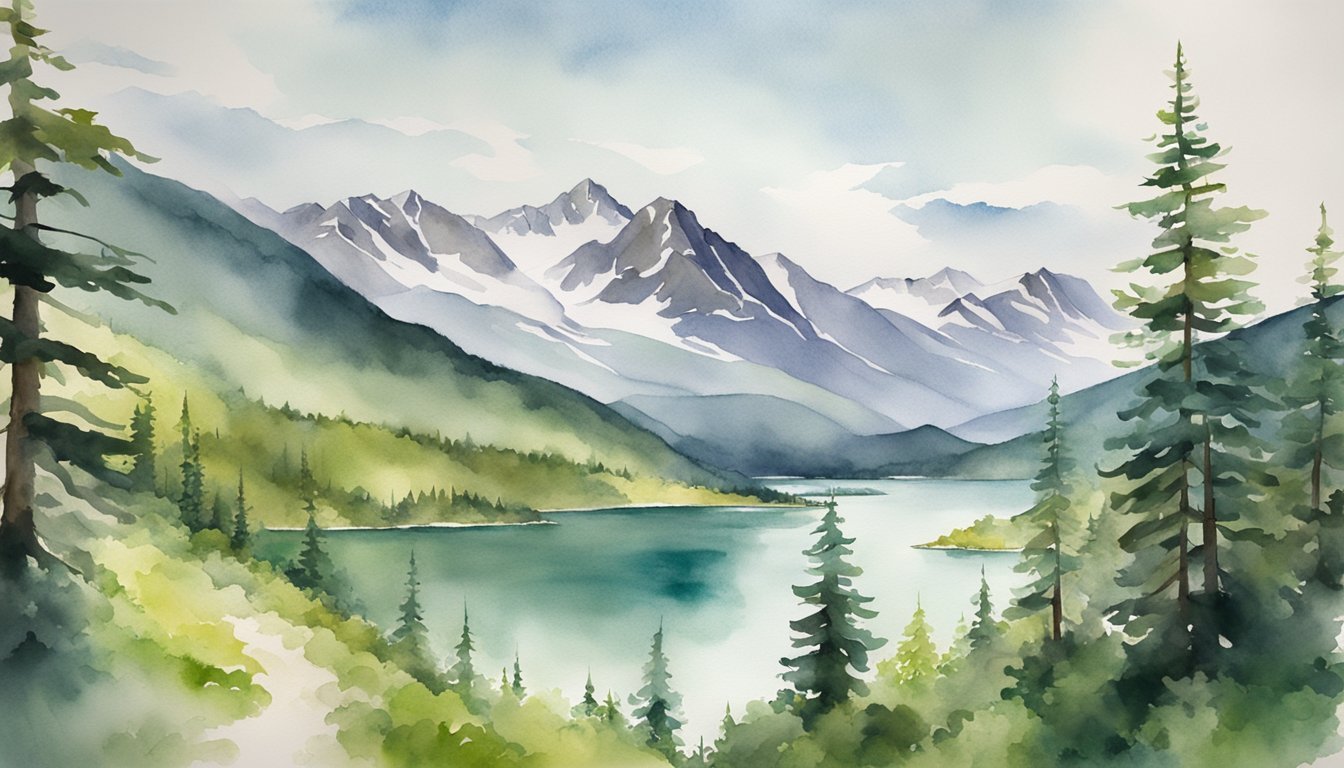Discovering North Cascades National Park
North Cascades National Park offers an array of natural attractions, from its expansive glaciers to the labyrinth of alpine lakes tucked within its rugged terrain. It’s a region that beckons explorers and nature enthusiasts alike to witness its American Alps and the diverse ecosystems preserved within.
Natural Wonders
The park boasts over 300 glaciers, the greatest concentration of these icy giants in the contiguous United States. These glaciers sculpt the park’s already dramatic geography, helping to carve the jagged peaks and sweeping forested valleys that define the Cascade Range. Among them, the park shelters a range of alpine meadows that explode with the colours of wildflowers during the brief summer months, and alpine lakes that range from the turquoise hues of Diablo Lake to the serene Emerald waters of Gorge Lake.
Adventure and Activities
Outdoor enthusiasts find the park’s rugged beauty perfect for a multitude of recreational activities. Scenic drives such as the North Cascades Highway reveal incredible vistas, with stops like the Diablo Lake Vista Point offering views of reservoirs sitting amidst the peaks. The park’s extensive trail network invites hikers of all levels to explore the backcountry, from gentle valley paths to strenuous hikes up to the high country, where one can gaze upon the alpine splendor spread out beneath the sky.
Wildlife and Wilderness
This expansive wilderness is home to a well-preserved ecosystem. Black bears roam the lower forests while mountain goats tread on higher ground. The park is not just a haven for these larger mammals but also for an impressive array of bird species, which make the park an excellent spot for birdwatching. In its efforts to maintain this natural sanctuary, the park also plays a significant role in wildlife conservation and the study of ecological impacts, particularly with regard to the effects of climate change on the delicate balance within the Cascades.
How Can I Experience the Untouched Splendor of North Cascades National Park Without a National Geographic Subscription?
To experience the untouched splendor of North Cascades National Park, explore its diverse trails and breathtaking vistas rather than relying on publications. For firsthand accounts and tips, search online forums and local guides. If you find you’re not interested in the glossy content, learn how to cancel national geographic to stop the subscription.
Planning Your Visit

Visiting North Cascades National Park offers a multitude of outdoor experiences, from scenic drives along the North Cascades Highway to exploring remote backcountry wilderness. Essential considerations for any traveler include understanding trail options, knowing about accommodations and accessibility, and planning for seasonal weather variations.
Trails and Camping
North Cascades National Park is a haven for hikers and campers, with over 400 miles of trails ranging from easy walks to challenging backcountry treks. The Newhalem Creek Campground, located near the park’s visitor center, provides a convenient base for exploring nearby trails and the beauty of the Stehekin Valley. Those looking for backcountry adventures will find opportunities for backcountry camping, but must secure a permit before setting out.
- Hiking Trails: From day hikes like the family-friendly Trail of the Cedars to strenuous routes leading to alpine lakes, the park caters to various skill levels.
- Camping Options: Visitors can choose from established campgrounds or venture into the wilderness for backpacking and backcountry camping.
Visitors can check trail conditions and secure camping permits via the official park website.
Accommodations and Accessibility
In addition to campgrounds, North Cascades offers various accommodation options including nearby lodges and motels for those desiring more comfort. Visitors with disabilities can access facilities at the North Cascades Visitor Center located just off State Route 20, which is a paved road that runs through the park and is typically clear and open from late spring to early fall.
- Lodging: Options outside but near the park boundaries include lodges and motels.
- Accessibility: The park strives to be accessible, with amenities available at the visitor center and some trails designed for wheelchair access.
The park itself does not charge an entrance fee, making it welcoming for all who wish to experience its natural splendor.
Seasonal Considerations
Weather in the North Cascades is highly variable, and preparation is key for a safe visit. State Route 20, also known as the North Cascades Highway, closes during winter months due to heavy snowfall and risk of avalanches, limiting access to certain areas of the park. The Washington Pass Overlook is a notable viewpoint on this highway that offers stunning vistas, but travelers should check if the pass is open before planning their visit.
- Spring/Summer: Best time for hiking and camping, as snow has typically melted on most trails and roads.
- Fall/Winter: Visitors must check road closures; certain areas are only accessible via cross-country skiing or snowshoeing.
For accurate seasonal planning information, travelers should monitor weather forecasts and park alerts on roads and trail accessibility before their trip.

